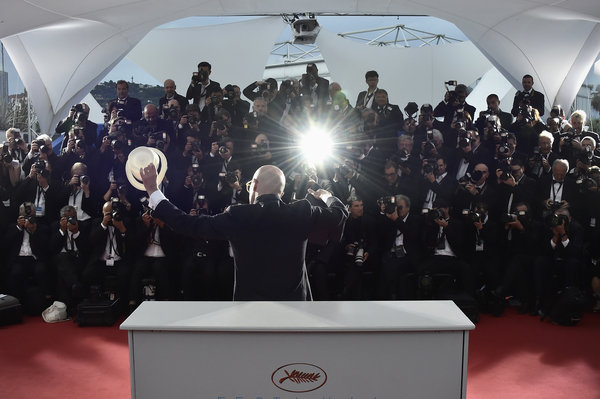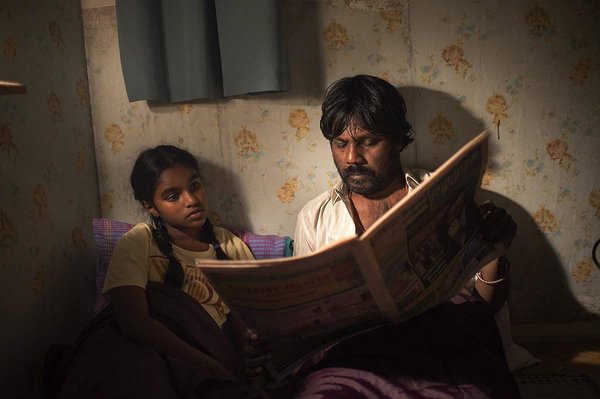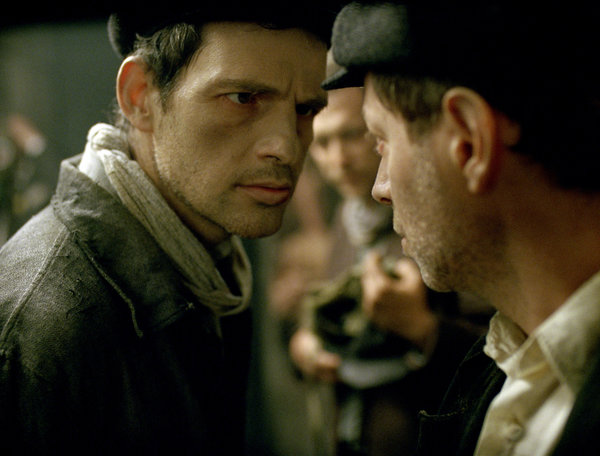
Dheepan Cannes Film Festival
Jacques Audiard charts the lives of three Sri Lankan refugees in Paris in a well-acted and gripping but finally overwrought immigrant drama.
The more things change, the more they stay the same for the Sri Lankan refugees of Jacques Audiard’s “Dheepan,” who flee their war-torn homeland only to find themselves in a new kind of conflict zone in the housing projects of Paris. A typically unpredictable career move by the prolific and varied Audiard following the unabashedly melodramatic romance “Rust and Bone” and the searing crime drama “A Prophet,” this almost entirely Tamil-language immigrant drama unfolds in solidly involving, carefully observed fashion for much of its running time, until it takes a sharp and heavy-handed turn into genre territory from which it never quite recovers. Commercially, this will be a far more specialized item than Audiard’s other recent work, especially in the U.S., where the film was acquired by IFC in advance of its Cannes bow.
There’s certainly no disputing that one of the breakout stars of Cannes this year is Antonythasan Jesuthasan, a former child soldier with the Sri Lankan militant group Liberation Tigers of Tamil Eelam, who fled the country in the late 1980s and eventually made his way to France, where he became an acclaimed playwright, essayist and novelist. “Dheepan” marks his first leading role in a film (after a supporting part in the 2011 Indian film “Sengadal”), but his commanding screen presence suggests it will not be his last.
Drawn partly from his own experiences, Antonythasan’s character here, Sivadhasan, is a rebel fighter who finds himself on the losing side in the waning days of Sri Lanka’s bloody and long civil war and resolves to make a new start of things in France. But in order to claim asylum, he’ll need a convincing cover story (as one of the oppressed, rather than an oppressor) and a family in tow (having lost his own wife and child to the carnage). In a refugee camp, he’s given the passport of a dead man, Dheepan, and paired with a wife, Yalini (Kalieaswari Srinivasan) and 9-year-old daughter, Illayaal (Claudine Vinasithamby), and placed on a boat bound for Paris.
Once they arrive, Dheepan and his new “family” are granted temporary visas and relocated to a large housing block in Le Pre-Saint-Gervais in Paris’ northeastern suburbs, where Dheepan lands a job as the resident caretaker. Despite its name ( “the meadow”), Le Pre is more of a concrete jungle where shadowy figures keep watch from rooftops and congregate in alcoves, and Audiard (who co-wrote the film with his regular collaborator Thomas Bidegain and Noe Debre) does a fine job of conveying, cinematically, the characters’ initial sense of displacement and disorientation as they navigate this not-quite promised land. Immigrant tales and portraits of banlieue life have been a steady subgenre of French cinema for decades now, but there’s a freshness to Audiard’s gaze here.
“Dheepan” is full of small but revealing details of language and other cultural barriers that make everyday life a struggle for the characters — a struggle that continues behind the closed doors of Dheepan’s apartment, where he and Yalini dance awkwardly around the fact that they are merely pretending to be husband and wife and, at least initially, seem to harbor no real feelings for each other. Some of the sharpest scenes in the film concern the various ways in which even a fake couple are forced to contend with the problems of coupledom and (especially) child rearing, as the emotionally fragile Illayaal begins acting out at school, and craves the kind of unconditional love that neither of her “parents” know how to provide.
Audiard implies early on that there are dangerous elements afoot on the periphery of the housing block, but the exact nature of their dealings only becomes clear when Yalini goes to work as a home-health aid for Mr. Habib, an infirm senior whose living room seems to be ground zero for the Le Pre dope trade. It’s there that Yalini first encounters Brahim (Vincent Rottiers, the French Edward Norton), a recently paroled lieutenant in Habib’s operation who stirs something in her that her sham husband does not. Meanwhile, Dheepan, unaware of Yalini’s new criminal cohorts, begins a crusade to clean up the neighborhood a bit, including the designation of a no-conflict zone in the central courtyard, marked off with painted white lines.
It’s around this point that “Dheepan’s” tightly focused narrative starts to spiral a bit out of Audiard’s control. There are so many stories competing for attention here that, in the end, they all get a bit short-changed, while the increasingly persistent allegory of Paris for Colombo — complete with Dheepan bumping into (and getting roughed-up by) a former Tamil Tigers colonel — feels labored in a way that’s atypical of Audiard. But that’s nothing compared with an abrupt action climax that feels like it stepped out of a 1980s Charles Bronson vigilante movie and which, despite hints that we might be headed in such a direction, feels mostly like an easy way of ending the show. Audiard supposedly came down to the wire to finish “Dheepan” in time for Cannes (where the print screened lacked final credits), and while the version shown here doesn’t lack the director’s typical technical polish (especially in the sleek widescreen cinematography by Eponine Momenceau), some additional time in the editing room might help to smooth over the movie’s rougher patches.
What keeps “Dheepan” engaging throughout is the tremendous charisma of the performers — not only Antonythasan, whose brooding intensity suggests that Dheepan’s real war is the one raging inside him, but Srinivasan, an Indian stage actress also making her film debut here, who is achingly tender as a young woman forced to become a wife and mother when she has barely figured out who she is herself.
Cannes Film Review: ‘Dheepan’
Production
Crew
With
Scott Foundas, Chief Film Critic@foundasonfilm
——————————–
At Cannes Film Festival, ‘Dheepan’ Wins Palme d’Or

The director Jacques Audiard won the Palme d’Or for his film “Dheepan.” PASCAL LE SEGRETAIN / GETTY IMAGES
By Manohla Dargis, ‘The New York Times, May 24, 2015
CANNES, France — The 68th Cannes Film Festival came to a surprising close on Sunday night when the Palme d’Or was awarded to “Dheepan,” Jacques Audiard’s tense drama about three Sri Lankan refugees struggling to assimilate in a violent French ghetto only to end up in a pastoral British backyard. The movie was well received by critics if far from a passionate favorite.
The Grand Prize, in effect the Palme runner-up, went to the widely praised Hungarian movie “Son of Saul,” a first feature from Laszlo Nemes. Set almost entirely in Auschwitz-Birkenau, it follows a Sonderkommando, one of those Jewish prisoners who were forced to help run the Nazi extermination camps, as he attempts to bury a child and locate a rabbi to recite a funeral prayer.
The Jury Prize went to “The Lobster,” an absurdist comedy from the Greek filmmaker Yorgos Lanthimos, about a world in which people who remain unmated are turned into animals. The Taiwanese master Hou Hsiao-Hsien won best director for “The Assassin,” a glorious martial arts film.
The French actor Lambert Wilson again served as the host for the awards, which took place in the grand Lumière Theater in the festival’s headquarters and this year included dance and musical numbers that gave the ceremony a distinctly Oscar-ized feel. The American filmmaking brothers Joel and Ethan Coen presided over a main competition jury that included the Mexican director Guillermo del Toro and the Malian singer Rokia Traoré.
The Caméra d’Or, for best first feature, went to “La Tierra y la Sombra,” from the Colombian director César Augusto Acevedo; the film was shown in a parallel section and was inexplicably preceded by a performance of “I Ain’t Got Nobody” sung by a tuneless John C. Reilly. Mr. Wilson followed this by singing “Happy Birthday” to Mr. Reilly. After another musical number, the trailblazing French filmmaker Agnès Varda, who will turn 87 on Saturday and whose films include classics like “Cléo From 5 to 7,” received a much-deserved honorary Palme d’Or.
The Mexican director Michel Franco won the screenwriting award for the English-language drama “Chronic,” about a nurse (Tim Roth) who draws intense emotional and psychological sustenance from his terminally ill patients. In another surprise, Rooney Mara, one of the stars with Cate Blanchett of “Carol,” Todd Haynes’s much-admired lesbian romance, shared the best actress award with Emmanuelle Bercot for “Mon Roi,” a less-loved melodrama from the French director Maïwenn about a woman recovering from a skiing accident and a terrible marriage.
Vincent Lindon won best actor as a middle-age factory worker who, after being laid off, ends up taking a job as a security guard in the French film “The Measure of a Man,” directed by Stéphane Brizé.
Un Certain Regard, a section that showcases younger filmmakers and somewhat riskier work than in the main slate, was won by “Rams,” a moving comedy turned tragedy from the Icelandic director Grimur Hakonarson that centers on two sheep-herding brothers who break their 40-year silence when their herds descend into crisis.
The Palme for the best short film was given to “Waves ’98,” from the Lebanese director Ely Dagher.
Information about other winners is at festival-cannes.fr.

